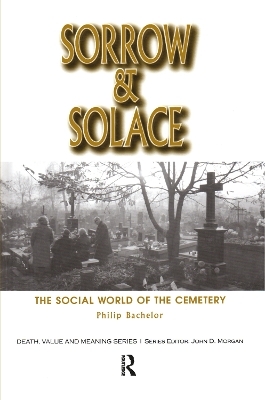
Sorrow and Solace
Routledge (Verlag)
978-0-415-78527-3 (ISBN)
Sorrow and Solace focuses on the importance of cemeteries in the lives of everyday mourners, and ways in which our bereaved give meaning to and draw value from their commemorative activities. The death of someone dear to us is among the most momentous life event that we experience. In many societies, visiting the grave or memorial is a common behavioural response to bereavement. Memorial sites provide vital connections to our deceased loved ones with whom we wish to maintain ongoing social bonds, and cemeteries are crucial places of deep healing and growth. Millions of visits are made to cemeteries every day, but the extent of this activity and its value to those who mourn - the topics of this volume - have long remained largely unrecognised. Large urban memorial parks are hives of activity for recently bereaved persons, and are among the most visited places in Western communities. Some cemeteries, hosting millions of annual visits, are more popular than many major tourist attractions. Cemetery visitation is a high-participatory, value-laden, expressive activity, and a most significant observable behaviour of the recently bereaved. This work will be invaluable to those seeking a scholarly understanding of bereavement, mourning, and commemoration. Written principally for professionals with a tertiary educational interest in related fields, such as grief educators, nurses, palliative carers, and social workers, it is also an important resource for the further education of other carers and service providers, including psychologists, physicians, counsellors, clergy, funeral directors, cemetery administrators, and monumental masons. The book is also a significant contribution to the field of social anthropology.
Philip Bachelor is past President of the Cemeteries & Crematoria Association of Victoria, and honorary Secretary of the Centre for Grief Education in Melbourne.
Introduction
PART A
Chapter 1. Evolution of the Cemetery Milieu
Recent Centuries
Garden Cemeteries
Railway Access
Compartmentalization
Cremation
Memorial Parks
Mausolea
Conclusion
References
Chapter 2. Death Today
When We Die
Why We Die
Where We Die
References
Chapter 3. Concepts of Bereavement and Grief
Bereavement Theories
Grief Processes
Sociological Perspectives
Accommodation of Grief
Impacts of Grief and Trauma
Conclusion
References
Chapter 4. Research Methodologies
Quantitative Methodology
Naturalistic Observation
Qualitative Methodology
Conclusion
References
PART B
Chapter 5. Visitation Patterns
Significance of Cemetery Visitation
Patterns
Frequency
Duration
Anniversaries
Trajectory
Summary
References
Chapter 6. Social Factors
Relationship
Age
Sex
Education and Employment
Conclusion
References
Chapter 7. Cultural Factors
Religion
Specific Religious Practices
Nationality
Primary Service
Conclusion
References
PART C
Chapter 8. Visitation Reasons
Obligation
Emotional Bond
Solace
Other Reasons
Summary of Visitation Reasons
References
Chapter 9. Visitation Activities
Placing Flowers
Maintaining the Grave or Memorial
Talking to the Decedent
Crying
Prayer
Other Activities
Summary of Visitation Activities
Reference
Chapter 10. Emotions
Sorrow
Solace
Guilt
Loss
Respect
Fear
Loneliness
Anger
Emotional Change
Summary of Visitation Emotions
References
Chapter 11. Frequency
Modulation
Turning Points
Summary of Visitation Frequency
References
Chapter 12. Non-Visitation Reasons
Non-Interment of Remains
Inability to Access the Cemetery
Grief Repression
Religious Restrictions
No Perceived Need to Visit
Summary of Non-Visitation Reasons
References
Chapter 13. Personal Values
The Funeral
The Cemetery
The Memorial
Visitation
References
Chapter 14. Working Through Grief
Grief-Work
The Place of the Cemetery Within Contexts of Grief
References
Glossary
Index About the Author
| Erscheinungsdatum | 11.02.2017 |
|---|---|
| Reihe/Serie | Death, Value and Meaning Series |
| Verlagsort | London |
| Sprache | englisch |
| Maße | 152 x 229 mm |
| Gewicht | 453 g |
| Themenwelt | Medizin / Pharmazie ► Medizinische Fachgebiete ► Notfallmedizin |
| Sozialwissenschaften ► Ethnologie ► Volkskunde | |
| Sozialwissenschaften ► Soziologie ► Mikrosoziologie | |
| ISBN-10 | 0-415-78527-8 / 0415785278 |
| ISBN-13 | 978-0-415-78527-3 / 9780415785273 |
| Zustand | Neuware |
| Haben Sie eine Frage zum Produkt? |
aus dem Bereich


